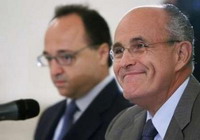Rudy Giuliani and Michael Bloomberg aspire to win presidency
Rudy Giuliani and Michael Bloomberg try to get into White House.

Being New York City mayor "is about as good a preparation for being president as exists," Giuliani said one morning last spring in Houston, Texas. Bloomberg coincidentally was across town delivering a similar message that same day. Giuliani, he said, "couldn't have been more right. I could not have said it better myself."
Two months before the first presidential primaries, Giuliani is nursing the front-runner's position among the Republican candidates. Bloomberg is considering whether to get into the race as an independent, while publicly denying any plans to do so.
With parallel political resumes and a shared spiel that City Hall is a White House stepping stone, the two mayors could one day be in a tug-of-war for support on the campaign trail.
Giuliani, who is actively campaigning, invokes the mayor-to-president theme more often than Bloomberg, who is not. Last week in New Hampshire, an early primary state, Giuliani hit the point several times in one day.
"New York City mayor is sometimes described as the second toughest job in the country," he said. A moment later, he added that the three leading Democratic candidates "never had the safety and responsibility of other people on their shoulders."
Bloomberg says he plans to remain in City Hall until the end of his term in 2009. But he keeps finding reasons to travel to presidential swing states and places that are rich with electoral votes, promoting himself and the idea that mayors roll up their sleeves while the federal government idles.
"We can't wait for Washington to come riding to the rescue - we've got to take the bull by the horns and do it ourselves," he said at a June appearance in California.
A month later, it was a similar message in Missouri - Washington is "dragging its feet" while cities are "taking the lead." Aides say he will raise that point again on a trip this week to Seattle and next month in New Orleans.
The two mayors may make the same case, but their style is markedly different.
Bloomberg is known for being dry, speaking in a near-monotone in front of crowds. Giuliani tends to give his audiences more red-meat rhetoric, delivered in his rhythmic cadence that goes from very fast to ... slow ... and ... deliberate ... for ... emphasis.
While they do share a certain brash New York bravado, Giuliani has softened that approach outside his hometown. He appears to be taking care to speak lightly and brightly, which is coming across as humble and disarming to at least some voters.
As for their policies as mayors, they had plenty in common - but the cities they inherited were vastly different.
Giuliani came to power in the early 1990s in a city split by racial tensions and infested with crime. He made the city safer, but his critics say he never improved race relations.
Then came Sept. 11.
Giuliani rushed to the scene, but was gone from office within months, succeeded by Bloomberg, a billionaire businessman whose main task was to place the city back on an even keel.
Bloomberg, a Democrat-turned-Republican-turned-independent, has crafted a reputation as being willing to meet with anyone - elected officials, union leaders, City Hall critics. He regularly reaches out to civil rights activist Rev. Al Sharpton, with whom Giuliani refused to meet, and has managed to improve the city's race relations.
Earlier this year, a brief tussle broke out when Bloomberg said he would not leave his City Hall successor with the same financial difficulties that he inherited.
Aides said later that he was referring to the post-9/11 fiscal crisis, but a deputy mayor from the Giuliani administration had a different take, telling the Daily News it was "revisionist history" and a slam against the former mayor.
The two have never been the best of friends, and Bloomberg pollster Doug Schoen recently revealed in a book that Bloomberg's mayoral campaign in 2001 had to press for support from Giuliani, who was being lavished with national praise and attention after the Sept. 11 terrorist attacks.
"No one on the Bloomberg campaign had known when - or even if - a Giuliani endorsement was forthcoming," Schoen wrote.
Eventually Giuliani agreed to the endorsement, which is widely believed to have given Bloomberg an edge in winning election days later. It has been said that Bloomberg now owes Giuliani, and that he would not dare get into the presidential race and spoil Giuliani's shot.
Bloomberg associates say this will make little difference in his decision, which will depend more upon whether he believes he can win and has something to offer that the two major party nominees lack - besides $1 billion (690 million EUR) to spend on a campaign.
Subscribe to Pravda.Ru Telegram channel, Facebook, RSS!




